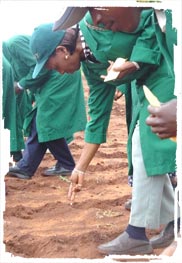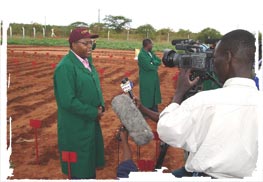May, 2005
 Kenya broke historic agricultural ground in a protected field on May 27 when it sowed its first transgenic maize seeds into local soil. Supported by the Syngenta Foundation for Sustainable Agriculture and the Rockefeller Foundation, this experiment is the first of its kind in the region. The Bt maize plants that sprout will be resistant to stem borer, an insect that drills into the maize stalk and causes significant losses to Kenyan harvests.
Kenya broke historic agricultural ground in a protected field on May 27 when it sowed its first transgenic maize seeds into local soil. Supported by the Syngenta Foundation for Sustainable Agriculture and the Rockefeller Foundation, this experiment is the first of its kind in the region. The Bt maize plants that sprout will be resistant to stem borer, an insect that drills into the maize stalk and causes significant losses to Kenyan harvests.
“Stem borers destroy some 400,000 tons of maize in Kenya each year, nearly equal to the nation’s annual imports of the crop,” says Dr. Romano Kiome, Director of the Kenya Agricultural Research Institute (KARI). By growing the Bt maize plants, farmers won’t have to worry about the pest or have to apply pesticide to counteract the destruction. “This is part of an innovative approach to help Kenyan farmers fight the insect pests, and it translates into increased food security and incomes,” Kiome says.
The field trials are being undertaken as part of the Insect Resistant Maize for Africa (IRMA) Project, a joint research project of KARI and CIMMYT. The goal is to verify the results from trials held at a biosafety greenhouse, which was officially opened in June of 2004. Researchers will now be checking to see how the transgenic maize holds up under field conditions

The trials will serve two purposes, according to IRMA Project Manager and CIMMYT maize breeder Stephen Mugo. First, they will be used to determine the effectiveness of various transgenic Bt genes against common Kenyan stem borers. Second, the plants will be crossed with Kenyan maize lines as part of a breeding process that will produce Bt maize varieties adapted to Kenyan growing conditions. The project is also developing stem borer resistant varieties using conventional breeding.
These trials are conducted in strict accordance with the terms proscribed by the Kenyan plant health regulatory body KEPHIS and the KARI and National Biosafety Committees, Mugo stresses. The open quarantine site where the confined trials are being held was built to their specifications and includes many biosafety and security measures to ensure that pollen, seed, or plant materials do not escape the trial area or cross inadvertently with maize not included in the experiment.
For further information, contact Stephen Mugo (s.mugo@cgiar.org)

